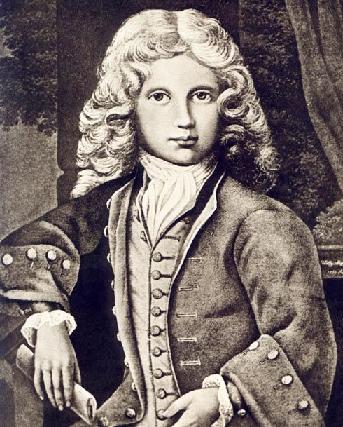
LITTLE MOZART AND HIS PRAYER.
MANY years ago, in the town of Salzburg, Austria, two little children lived in a cot covered with vines, near a pleasant river. They both loved music; and, when only six years old, Frederika could play well on the harpischord. But, from her little brother, such strains of melody would resound through the humble cottage as were never before heard from so young a child. Their father was a teacher of music, and his own children were his best pupils.
There came times so hard that these children had scarcely enough to eat; but they loved each other, and were happy in the simple enjoyments that fell to their lot.
One day, they said, "Let us take a walk to the woods, it is so pleasant. How sweetly the birds sing! And the sound of the river, as it flows, is like music." So they went.
As they were sitting in the shadow of trees, the boy said thoughtfully, " Sister, what a beautiful place this would be to pray!" Frederika asked wonderingly, "What should we pray for?"
"Why, for papa and mamma," replied her brother. "You see how sad they look. Mamma hardly ever smiles now, and I know it must be because she has not always bread enough for us.
Let us pray to God to help us."
"Yes," said Frederika, "we will." So these two sweet children knelt down and prayed, asking the heavenly Father to bless their parents and make them a help to them.
"But how can we help?" asked Frederika.
"Why, don't yon know?" replied Wolfgang.
"My soul is full of music; and, by and by, I shall play before great people, and they will give me
plenty of money. And I'll give it to papa and mamma, and we'll live in the fine house, and be happy."
At this, a loud laugh astonished the boy, who did not know any one was near them. Turning, he saw a fine gentleman, who had just come from the woods.
The stranger made inquiries, which Frederika answered, telling him, "Wolfgang means to be a great musician. He thinks he can earn money, so that we will not be poor any more."
"He may do that, when he has learned to play well enough," replied the stranger.
Frederika answered, "He is only six years old, and not only plays beautifully, but can compose pieces."
"That cannot be." replied the gentleman.
"Come to see us," said the little boy, " and I will play for you."
"I will go this evening," answered the stranger."
Then, as he turned to go, the boy took hold of his coat, and said, " Do you think God will send us some dinner We have asked him to."
"I think he will," was the reply.
The children went home, and told their story to their parents, who seemed much pleased and astonished.
Soon, a loud knock was heard; and, on opening the door, the little family were surprised to see men bringing in baskets of richly cooked food, in variety and abundance.
They had an ample feast that evening. Thus God answered the children's prayer.
So6n after, while Wolfgang was playing a sonata, which he had composed, the stranger entered, and stood astonished at the wondrous melody. The father recognized in his guest Francis I., Emperor of Austria, who had been residing in the vicinity.
Not long after, the family were invited by the emperor to Vienna, where Wolfgang astonished the royal family by his wonderful powers. From that time, the father and his children gave concerts in many cities of Germany and France.
At the age of fifteen, Wolfgang Mozart was acknowledged by all eminent composers as a master.
These are some incidents in the life of the most eminent musical genius the world has ever known.
He was good as well as great. The simple trust in God, which he had learned in childhood, never forsook him. In a letter to his father, he says:—
"I never lose sight of my God. I acknowledge his power, and dread his wrath; but, at the same time, I love to admire his goodness and mercy to his creatures. He will never abandon his servant.
By the fulfillment of his will, mine is satisfied. I shall always make it my duty to follow punctually the counsels and commands you may have the goodness to give me."
—M. P. H.,
in Well-Spring.